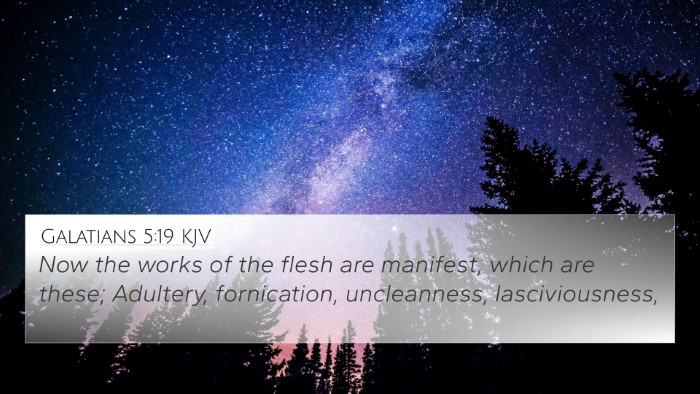Understanding Romans 8:5
Bible Verse: Romans 8:5 - "For they that are after the flesh do mind the things of the flesh; but they that are after the Spirit the things of the Spirit."
Meaning and Interpretation
This verse from the Apostle Paul's letter to the Romans delves deep into the contrast between living according to the flesh and living according to the Spirit. Paul emphasizes the importance of mindset, highlighting that those who pursue worldly desires will be engrossed in the flesh's concerns, while those who seek spiritual fulfillment will focus on matters pertaining to the Spirit.
Commentary Insights
- Matthew Henry: Henry outlines that the “things of the flesh” encompass worldly desires and sinful inclinations, leading to spiritual death, whereas the “things of the Spirit” cultivate life and peace. He stresses that true Christians, influenced by the Spirit, will naturally align their thoughts with divine matters.
- Albert Barnes: Barnes emphasizes the moral struggle inherent in human experience. He interprets “mind” as the focus of one’s thoughts and wishes, arguing that the flesh's perspective leads to death while a mind centered on the Spirit results in peace and life. His commentary advises believers to nurture a Spirit-led mindset.
- Adam Clarke: Clarke elaborates on the implications of living in the flesh versus living in the Spirit. He contextualizes this within the larger narrative of the Christian journey, suggesting that a focus on spiritual matters results in eternal benefits, urging believers to prioritize their spiritual growth.
Cross-References
To gain a better understanding of Romans 8:5, it is beneficial to consider related scripture. Here are some cross-referenced verses:
- Galatians 5:16 - "This I say then, Walk in the Spirit, and ye shall not fulfill the lust of the flesh."
- Colossians 3:2 - "Set your affection on things above, not on things on the earth."
- John 3:6 - "That which is born of the flesh is flesh; and that which is born of the Spirit is spirit."
- Philippians 3:19 - "Whose end is destruction, whose God is their belly, and whose glory is in their shame, who mind earthly things."
- 1 John 2:15 - "Love not the world, neither the things that are in the world."
- Romans 8:6 - "For to be carnally minded is death; but to be spiritually minded is life and peace."
- 2 Corinthians 5:17 - "Therefore if any man be in Christ, he is a new creature: old things are passed away; behold, all things are become new."
Thematic Connections
Exploring thematic connections, Romans 8:5 reflects significant biblical themes:
- Life vs. Death: The stark contrast between spiritual life through the Spirit versus the death associated with fleshly pursuits.
- Spiritual Transformation: Emphasizes the transformative power of the Holy Spirit in the believers' lives.
- Minding the Spirit: The principle of focusing on spiritual matters is a consistent teaching throughout the New Testament, aligning with Christ's teachings in the Gospels.
- Dual Nature of Humanity: The struggle between flesh and Spirit is a recurring theme in Pauline theology, particularly in relation to sanctification.
Practical Applications
For believers today, Romans 8:5 serves as a reminder to examine one's focus and priorities:
- Self-Reflection: Assessing areas where one may be overly focused on worldly matters.
- Spirit-led Living: Encouragement to cultivate a prayer life and engage with Scripture to better align thoughts with the Spirit.
- Community Support: Finding a church community that prioritizes spiritual growth and accountability.
Conclusion
In conclusion, Romans 8:5 illustrates the dichotomy between living according to the flesh and living according to the Spirit. By understanding and applying the insights from public domain commentaries and related scriptures, believers can deepen their understanding of this pivotal verse and its implications for daily life.
Further Study: Tools for Cross-Referencing
To explore more about cross-referencing biblical texts, consider utilizing:
- Bible Concordance: A tool that helps locate specific verses and their connections.
- Bible Cross-Reference Guide: Helps to identify related verses within the Scriptures.
- Cross-reference Bible Study Methods: Techniques for exploring themes and connections across the Bible.















